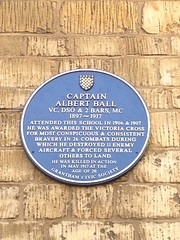Capt Albert Ball VC MC DSO & 2Bars
Capt Albert Ball VC MC DSO & 2Bars
(1897-1917)
Commemorated on 1 plaque
Captain Albert Ball VC, DSO & 2 bars, MC 1897-1917 attended this school in 1906 & 1907. He was awarded the Victoria Cross for most conspicuous & consistent bravery in 26 combats during which he destroyed 11 enemy aircraft & forced several others to land. He was killed in action in May 1917 at the age of 20.
Brook Street, Grantham, United Kingdom where they attended school

